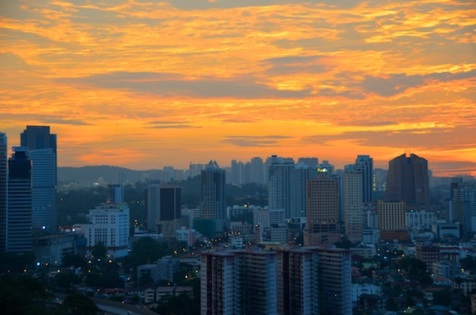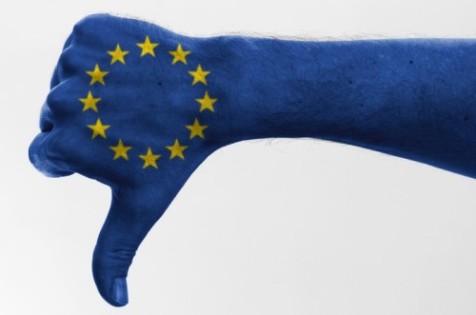
by Enrique Lescure
Introduction
And so we came to this day. A global climate treaty has finally been agreed upon by 195 participating countries. World leaders and many activists are celebrating these happy news – in a political year which have not contained much of these.
This treaty represents a morale booster for the western countries – France in particular – which have consistently failed to handle the Ukraine crisis, overthrow Bashar al-Assad in Syria or save the Schengen Area from an implosion caused by the refugee crisis. The climate treaty should be understood with regards to the failure to manage other crises – if political leaders consistently are mishandling – or perceived as mishandling – crises, their prestige will suffer. If such failures erupt more and more frequently during several administrations, the public morale will decrease and thus the support amongst the masses for the legitimacy of the establishment will weaken.
This created an atmosphere which saw it as paramount that a new treaty would come in place, not only because that the environmental situation is getting more dire, but also because of the aforementioned crises and the needs for political leaders to come back from Paris with successes.
While 1,5 degrees indeed is an ambitious goal, especially as the treaty has arrived so late in the process since this issue became one of global importance.
The purpose of this article is to study the climate treaty in the context of antropogenic global climate change as well as our current socio-economic system, and to discuss some of the actions that can be done to reduce the impact of warming.
TL;DR
- The greenhouse effect is not – as you probably know – something sinister brought by our tampering with the environment, but a part of a natural process.
- For the last few million years, our climate has gravitated between warm periods and ice ages. The release of CO2 from fossile sources has shifted this balance towards a warmer climate, but the cycle is still existing.
- The threats against human civilization are manyfold and serious, and require responses and sacrifices which currently are politically impossible to advocate.
- The Paris Treaty consciously leaves a lot regarding implementation to be decided by the signatory powers.
- Ultimately, we need to focus on more issues than emissions, one of the most pressing being the protection and expansion of the world’s woodlands.

What is the Greenhouse Effect?
The climate of the Earth is regulated by many factors – the distribution of continents and oceans, tectonic activity, internal heating, the intensity of solar flares, the tilt of the Earth’s axis, the amount of vegetation and the greenhouse effect. The greenhouse effect is the name for a process whereas heat from the Sun is trapped under the Earth’s atmosphere and serves to heat up the Earth. Without it, multi-cellullar life on Earth as we know it would be impossible, and the Earth would have frozen to an ice planet aking to Hoth in Star Wars.
The Greenhouse effect is not caused by humans, but something which has existed since time immemorial. It allows heat from the Sun to warm up the surface of the Earth. Neither is it unique for the Earth, both the other rocky planet’s in the Sun’s Goldilock zone have greenhouse effects, though the greenhouse effect is very weak in Mars and extremely strong in Venus.
The greenhouse effect has also varied under different aeon’s and geological periods during our planet’s turbulent history. During the Silurian era, prior to the Cambrian explosion, the Earth was for thousands of millennia covered by ice. When the Dinosaurs roamed the Earth, the planet was so warm that there were no permanent polar ice caps, and the climate was fairly stable with few fluctuations.
In contrast, the Eocene and Paleocene eras have been dynamic and unstable in regards to the planet’s average temperature. During only the last two dozens of million years, multiple ice ages have seen sheets expand over the hemispheres, the Mediterranean have evaporated several times, leaving a salt desert between Europe and Africa, and the sea levels have shifted hundreds of metres, often within just years.
The Flood myths described in numerous holy texts may have a foundation in reality as several events during the stone age led to the rise of sea levels and (probably) massive floods.

Ice Age World Map by Fenn-O-maniC (Deviantart)
The human civilization, established in the river valleys of the Nile, of the Euphrates and Tigris, of the Ganges, Indus and the Yangtze, and developed into today’s global civilization, was starting to form following the end of the last global Ice Age.
From the latter half of the 13th century, the warm period reached its peak, and then the planet’s cycle started to move towards an ice age again. From the 1860’s and onward until today, this trend towards a colder climate first stalled and then reversed – today proven to be caused by human intervention due to the burning of coal and oil.

Effects of antropogenic climate change
By altering the amount of carbon-dioxide in the atmosphere, we are strengthening the effects of the greenhouse effect and therefore increasing the Earth’s average temperature gradually, though at a higher speed than previously done.
This will not mean that we won’t have cold winters any more, or that temperatures in some regions cannot actually can become colder over time, but it means that we are shifting and altering the Earth’s climate cycle towards on-average warmer temperatures.
Such a climate alteration will have effects on crop harvests, monsoon rain patterns, sea currents, vegetation and species, and also on the Greenlandic Ice Sheet – the last large remnant from the recent Ice Age. If it partially or completely collapses, which can happen within a few centuries, it will affect the sea levels of the Earth globally, drowning coastal areas, amongst which are some of the most populated regions on Earth.
Another single factor that can create havoc for human civilization globally, is the end of the Himalayan glaciers. They supply the great rivers of India and China with water, and if they melt there could be a permanent shift of these regions towards a drier climate, which would increase the cost of living. The Middle East could become more dry, as well as the United States.
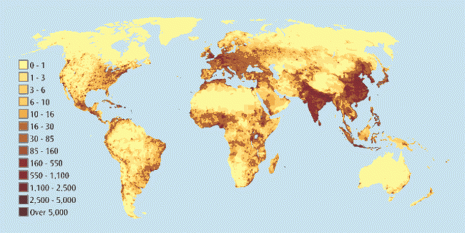
Since Civilization first was established, most of humanity has lived in an east-west band stretching from East Asia to Western Europe. The 21st and 22nd centuries may correspondingly see China, India and the Mediterranean basin becoming more desert-like, whereas other regions on the other hand can become more hospitable, for example Scandinavia, Northern Canada, Siberia and parts of the southern hemisphere.
Thus, a shift in the habitability of the Earth’s regions could lead to a mass migration of hundreds of millions to billions of people, which forever could alter the geographic distribution of the human race.
Climate change as a political issue

Between the beginning phase of the Kyoto negotiations and the signing of the Paris Agreement in December 2015, two decades have passed by. During that time, more emissions have been added on, as the debt-based monetary system requires growth and the technologies available today which creates the fastest growth rates are based on non-renewable energies. Thence, while indeed the usage of green technologies have grown, they have not grown at the expense of fossil fuel-technologies, but rather their growth have been concurrent.
There are two problems with legislation aiming to curb climate change. The first one is the aforementioned fact that our leaders are bound to a growth paradigm, and the second is the fact that the Earth consists of 195 countries. Regarding some issues, like for example a failure to abide to the needs of economic globalization, sovereignty is seen mostly as a matter of inconvenience, while other issues, such as keeping up emission rates, are met with far more understanding than not wanting to partake in international trade agreements.
Ultimately, the absolute majority of the states on Earth, to not speak of businesses, are invested in a global socio-economic system based on fractional reserve banking, which means that in order to pay off ever increasing debts, we find ourselves in continuous need to create conditions so favourable as possible to exponential economic growth. This system is also seen as the best potential system we can have, and economic growth has also an ideological foundation. Most of the states on Earth are not nation-states but rather former colonial territories, composed of multi-ethnic, multi-religious communities. In such states, the main legitimising factor for governments that are both simultaneously weak and authoritarian, is economic growth. You may have to long for buying new shoes, but your son may buy himself a bike.
This means that climate agreements are meeting far more resistance from both business, lobbyist groups and governments keen to keep up economic growth, than for example free trade agreements. The Kyoto Protocol failed because the Bush Administration refused to ratify it. The Copenhagen Summit is widely considered a failure. The French government therefore decided on a strategy where the emphasis was put on the goal – that the temperature may not increase with more than 1,5 degrees Celsius (0,5 degrees under the 2 degrees Celsius seen as the threshold for global warming). All countries partaking under the Paris Agreement have bound themselves to find ways to reduce their emission rates, but the Agreement doesn’t specify how or with what means, and does not at all install any controls or punishments for participants violating the agreement.
On the other hand, if the agreement had contained more binding resolutions, specifications and relinquishment of controls, it would have been rejected by a significant number of countries.
So in short, the choice was between a broad-sweeping but shallow agreement, or no agreement at all. Most analysts hope that green energy and green technology can help making the shift towards sustainability while economic growth is preserved.

The Elephant in the Room
While we have reasons to be hopeful due to the increase of the usage of solar panels, wind turbines and other forms of green energy, green energy is only a part of the puzzle. Most of the emissions today are within the meat industry and transport, and the growth of green energy has not contributed so much to the decline of the price of oil.
Rather, while the demand of oil has grown, the supply has grown even quicker due to the ascent of North American shale oil and the response of the Gulf States to dump the price of oil by increasing their supply. What we are seeing behind the curtains is an oil war initiated by Saudi Arabia and directed against both the USA and Russia. While this has hurt all oil-producing states, oil consumption overall is increasing.
What stands clear is that emissions may be reduced regionally, but globally they will still pose a threat. The kind of exponential economic growth intrinsically connected to the current system is – through the invisible hand of the market – seeking the paths of least resistance. Innovations and ambitions can alter this balance, but the balance in itself under the current paradigm is problematic.
Therefore, while supportive of green technologies and aims to curb emissions, I remain skeptical of the ability of achieving the objectives of 1,5 degrees without putting under question the ideological predominance of the current socio-economic system.
The current system is collapsing, or rather in its very design it is a system under constant collapse, threatened to be choked by the mountains of debts that it is pushing before itself. It can only survive by cannibalising the Earth, generating economic growth, but the more growth it generates, the more growth it has to generate. Thus, growth numbers tend to decline as demand shrinks and the economy grows, creating stagnation which means that new markets have to emerge in order to fuel the constant need to pay interest rates to the banks which simultaneously function as both the parasites and the creators of the system.
If we do not question the wisdom of this, we will continue to destroy the Earth. The problem is that arrangements like the Paris Agreement, the surprisingly – in relation to the scope of the challenges before us – toothless and impotent treaty, are not only unable to criticise the system which all participants have invested themselves in, but also to propose far-sweeping efficient measures to combat climate change.
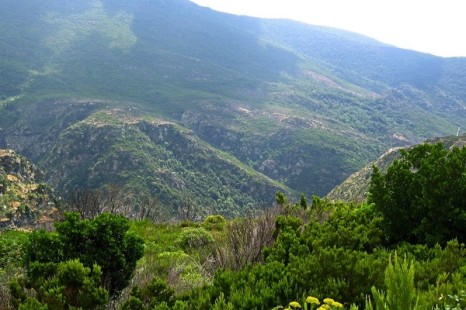
Actions that can be undertaken
Of course, for maximum efficiency, most of the transformation must necessarily occur at the grassroot level, though the creation of municipal solar panels, neighbourhood greenhouses, car pools, the upgrading and upcycling of means of transportation, increased consumption of locally produced goods and services, and increasing the autonomy and resilience of local communities overall. Education of both young and adults is also necessary.
However, we cannot move towards that and a globalized economy of the kind the proponents of free trade agreements like the TTP and the TTIP are dreaming of. One particular thing that definitely is conflicting between the kind of free trade agreements that are proposed today and long-term sustainability is transportation. If we want to reduce emissions, we need to install carbon pricing on goods and services, so the price starts to reflect the environmental cost. Goods that are produced far away would need an additional price tag. This is not the same as a punitive tariff as it will be imposed in relation to distance rather than national borders in themselves.
Massive investments need to occur in public transit systems (and in sea walls). We need to gradually shift ourselves away from Suburbia and create more concentrated urban habitats which also should have an ability to sustain at least a part of their own food production potential through vertical farming.
We need to massively reduce our dependency on meat, and then especially red meat, since it stands for a significant chunk of the emissions. This means that meat must become far more expensive, to pay for its share of the environmental damage which it causes.
More trees will have to be planted, at the expense of mono-cultures and grasslands. We should probably even build floating platforms on the seas and grow trees on them. All plants are breathing carbon dioxide and binding it before releasing it and returning it to the cycle when they die. Trees have the benefit that they can live for centuries, and therefore they can bind carbon for significantly longer amounts of time. The ideal would be if we could approach the number of trees which the Earth contained during the Stone Age, meaning that we would have to double the amount of trees to 6 billion.
These are but some of the actions that should be considered, and where governments on the local and national level could play a significant role (and should play it, especially regarding preparations for moving entire cities).

Long term Geo-engineering
Ultimately, we have shifted the Earth’s climate development. What we need to do after we have stabilised it is to establish a long-term strategy to manage it, using carbon dioxide, oxygen, vegetation and technology to both monitor and gently steer the climate, both to prevent future disasters generated by us as well as managing the human civilization and the eco-systems through large-scale natural disasters such as meteorite impacts and super-volcano eruptions.
This would require some form of global administrative system, and signals that we are moving towards a Type-1 civilization if we manage to answer to the challenges of this century. Therefore, the public discourse should not focus on the coming five years, but the coming five decades at least.













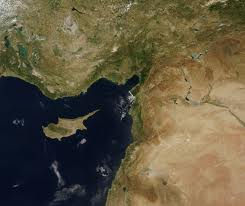

 contention, namely the role of one man – Bashar al-Assad. If he doesn’t resign, neither the opposition nor the West wants to accept a peace treaty. If the west doesn’t drop its demand that the president resigns, then Russia and their allies refuse to accept a peace treaty.
contention, namely the role of one man – Bashar al-Assad. If he doesn’t resign, neither the opposition nor the West wants to accept a peace treaty. If the west doesn’t drop its demand that the president resigns, then Russia and their allies refuse to accept a peace treaty.
































